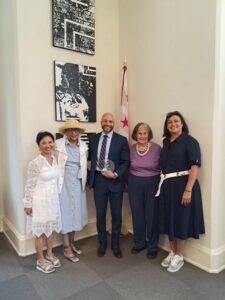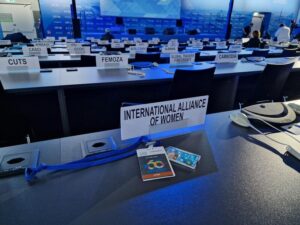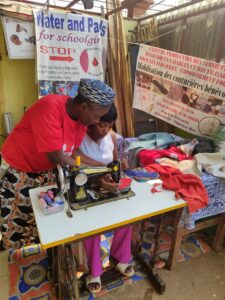The 37th IAW Congress took place in Nicosia, Cyprus on 20-28th of October 2017.
Cyprus is a very beautiful island situated in the North Eastern part of the Mediterranean Sea. It is also the largest island in the Mediterranean. Cyprus joined the EU in May 2004 and has been a member of the Euro zone since the 1st of January 2008.
Cyprus is situated on the crossroads of three continents: Europe, Asia and Africa. This geographic position has since antiquity played an important part in the island’s turbulent history. Its prehistoric age inhabitants were joined by the Mycenean Greeks 3500 years ago who introduced and established their civilization thus permanently instilling the islands’ Greek roots.
Many other cultures have followed since then including Phoenicians, Assysians, Franks, Venetians, Ottomans, British, who all left behind them traces of their passage. The island is kind of an open air museum.
Cypriots are very hospitable people, and also hard-workers. This has been proved by the way they organised our Congress in Nicosia which was excellent. The hotel at which we stayed was of high standards. The rooms were very nice. The staff was very polite and helpful. The food was very good and we had comfortable and spacious rooms for our meetings. We have been offered three dinners. One was at the restaurant of the hotel when we arrived. Another one was in a taverna in the city near the green line which divides Nicosia from its Turkish occupied part and a farewell party in a special room of the hotel with food, dances and songs. Everyone enjoyed herself/himself very much and many of our members danced together with the Cypriot dancers. On the second day of our arrival, we went to an excursion to Paphos with a good guide who gave us a lot of information on the numerous archaeological sites of Paphos which is a UNESCO listed World Heritage Site. We also had lunch in a very beautiful taverna. Later in the week, we had a walking tour in the city of Nicosia with the same guide. We visited the Cyprus Museum, the largest archaeological museum of Cyprus and other places of great interest.
The 37th Congress of IAW in Nicosia was a great success due to the efforts of the Cypriot organisation as well as the work of the IAW, and in particular of its Executive in the preparations of the Congress.
The feelings we had while preparing the Congress were mixed. A lot of work was done: collecting documents, drafting others, circulating them, making corrections, and waiting for people to register.
We had a number of cancellations at the last moment for different reasons (illness, family, etc..) which made us feel a little pessimistic. All this changed with the opening of our Congress when many people arrived. Some new faces, also young faces, and interesting people. We had no problem in establishing a quorum. We even had more people running for the Board than anticipated. After that, everything worked very well and there was a new dynamic. Many people found that it was a very good meeting, democratically conducted and everybody had a chance to speak. Everybody felt committed. We listened to each other even if we disagreed. However, one point that was mentioned by many participants was the fact that discussions did not go into depth. There was a lot of discussion on procedures but very little on substance. The report of the Communications’ Unit was distributed 5 minutes before the discussion on the subject of the database was opened. The elaboration of a strategy to deal with the external challenges that the organisation is facing in particular the backlash on women’s human rights that is taking place internationally was not touched upon.
In my speech, I referred to a number of ideas for the elaboration of a strategy for the future by the IAW. Work for a new economic model by using feminist economics. Elaborate a strategy for the future that should take into account not only gender inequalities but other inequalities based on race, colour, etc. Work in collaboration with other social movements and address the needs of all women, in particular the most marginalized ones. Adopt the intersectionality approach. We could organise a summer school for young feminist through which we could recruit new members to IAW, bring all generations into a dialogue for the promotion of women’s human rights. Put an emphasis on the regional level by organizing regional seminars and conferences.
We all have to make an effort to make the agenda on women’s human rights and gender equality of IAW go further and we cannot do it with business as usual. So, we have to try to find new ways. We have to support people who are doing projects like Ursula Nakamura and Gudrun Haupter on water and pads, Anje Wiersinga on the SCR 1325, Esther Suter on peace on the Korea Peninsula, Monique Bouaziz and Danielle Levy in UNESCO who, together with other NGOs, succeeded in finding funds in order to help members of the African Associations to get trained in water technologies in Cote d’Ivoire among whom 5 were from the DR of Congo. They, in turn, will train others. We have to present to the outside world a constructive image of IAW.
Many important decisions were taken by Congress. A fund was established with 25,000 euros of the total IAW assets with the purpose of giving support to a wide a range of IAW activities to be approved by the Executive committee (organizing, for example, regional meetings and participation).
Hiring an independent auditor and publishing her/his report on the IAW website.
Re-opening our negotiations with the Midguard professionals to be conducted by the IAW Communications’ Unit for the establishment of an IAW database.
A strong Action Plan for 2018-2020 was adopted with a number of pillars that coincide with our Commissions. The pillars have to do with violence against women and girls, Justice and Human Rights, Women and Climate Change, Women and Health, Women and Peace, Women in the Economy and Democracy.
I distributed a discussion paper on how the Action Programme can be implemented by for example using the concluding observations of CEDAW to national reports submitted to it to hold governments accountable.
I presented my Political Declaration on holding governments accountable on Women’s human rights and gender equality: “A new form of feminist activism to strengthen CSOs and feminist organisations”. The Declaration was adopted.
10 Resolutions were adopted on many different issues: on Justice for Victims of ISIL, on the protection of women’s and girls’ fundamental rights, on a peace treaty for South-Korea, on female genital mutilation, on keeping girls in school during menstruation, on new tools to support and educate girls in emerging markets: from micro-entrepreneurship to labour rights, and corporate accountability, on the protection of the rights of the Rohingya women and girls in Burma, on the Security Council open debate on Women, Peace and Security, on a call for full implementation of the Security Council Resolution 1325 including National Action Plans and participation of women in the Peace Negotiations, and on the implementation of the Treaty on the prohibition of Nuclear Weapons.
A number of organisations have applied to become affiliate/associate members of IAW, the majority are from the developing world and they were admitted. IAW has now 52 member organisations (31 affiliates and 21 associates).
Constitution, by-laws
A number of amendments to the Constitution and the by-laws were adopted. The maximum number of members of the Board is now 15 instead of 20. Many of our members were against the reduction of the maximum number of the Board but the argument of reducing the number was explained as ensuring that a quorum was easily attained. The amendment was adopted by a vote. The Constitution and the by-laws were adopted as revised.
Presentation of the project “water and pads” by Ursula Nakamura and Gudrun Haupter
This project will particularly address the education and the management of menstruation hygiene of school girls and raise students’ awareness on unwanted pregnancies. The project will also strengthen networking at the national and international level by strong advocacy which addresses communities, governments and also the private and public sector.
CSW 62: A statement on the priority theme “rural women and girls” was submitted by IAW on the 17th of November. Concerning side-events, Anje Wiersinga informed us that she will be organizing one on UN Security Resolution 1325 concentrating on Syria and Cyprus.
IWN News: A decision was taken that the Journal will continue as thematic. Each publication now focuses on a specific theme and discusses its different aspects. There have been enthusiastic comments on our Journal, in particular for the issue on Young Feminists. With new people writing for the IWN Journal, we are finding new friends and allies in our fight against gender inequality and the violations of women’s human rights. The Journal can also be used as a tool for building alliances and elaborating projects with other NGOs.


